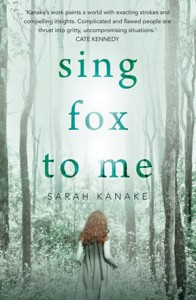Sometimes you read a review and it makes you want to race out and buy the book. That’s how I felt after coming across Whispering Gums’ review of Sarah Kanake’s debut novel, Sing Fox To Me, a story which makes the most of its “gothic” setting in Tasmania.
 WG takes us on a journey with the novel’s characters, exploring themes of loss, family discord and disability. She teases out the book’s intrigues and along the way showcases Kanake’s fine use of language:
WG takes us on a journey with the novel’s characters, exploring themes of loss, family discord and disability. She teases out the book’s intrigues and along the way showcases Kanake’s fine use of language:
The trees relaxed and the leaves swayed, almost as if they could finally breathe. The creek rushed, not because it was chasing anything, but because it longed to feel the smooth and stable rocks underneath … (Part 6) [complete review here]
What a joy it is to read the impressions of a thoughtful reader and her appreciation of a fine book. It was a bit of a shock, therefore, to go from this to Carolyn’s review of the same novel and see that this reviewer only gave it 3 stars on Goodreads. Carolyn writes:
For me this was a strangely unresolved story that left me wanting more. The mysteries are never solved except perhaps in the old man’s imagination, but it is a book with powerful imagery that continues to resonate with me after finishing…
I can’t help wondering how hard it must be for publishers and authors to pitch a book to the right audience. Well-resolved endings and certainties appear almost a must for popular fiction (and I personally love a page-turning story), but they’re features that aren’t so important in more literary novels, and may even go against the work in the opinion of some readers. So much appears to come down to individual taste. Both reviewers were moved by Sing Fox To Me and it stayed in their imaginations: that’s enough of a recommendation for me. It’s one book I’m going to look out for in the library.
~
Author: Sarah Kanake (@SarahKanake)
Title: Sing Fox to Me
Publisher: Affirm Press
Date: March 2016






Lovely thoughtful post, Elizabeth, and not just because you mention me for which I thank you.
You raised some good points about expectations in different forms of fiction. Readers of literary fiction can often be irritated by books that are too resolved because it doesn’t seem real, whereas readers of popular fiction, I think, read less for reality than for escape, so they want the satisfaction of resolution, preferably with a degree of happiness? Neither is right or wrong, is it, just a matter of horses for courses.
Thanks, Sue. And publishers who give “popular fiction”-type covers to literary books may attract a wider readership, but also disappoint the reader’s expectations. (I was going to comment on the trend of showing a woman’s back in a landscape, but wanted to keep the post short. What’s that about, I wonder?)
Who knows, but I agree it’s weird … about vulnerability perhaps?
And good on you for keeping the post short!